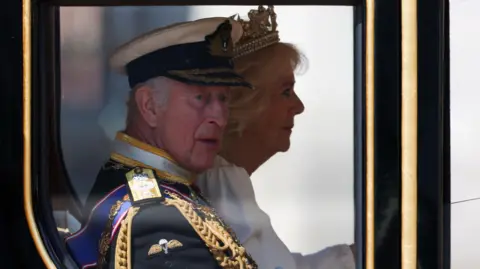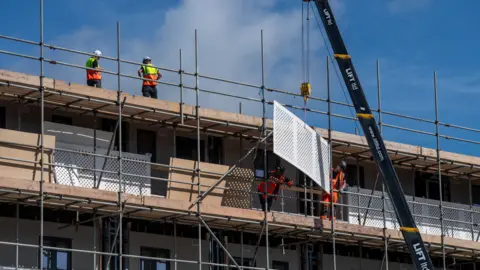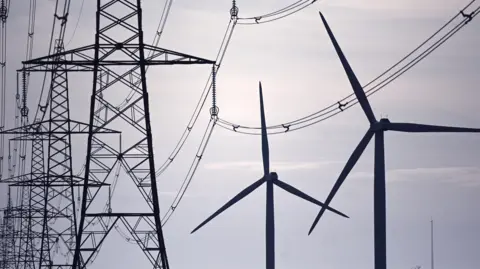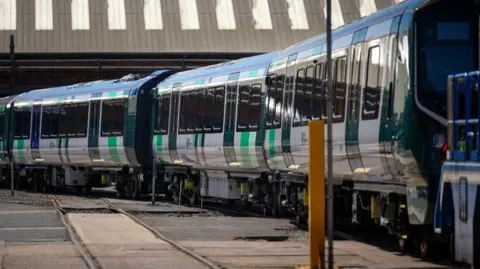By Paul Seddon, Political reporter

 Reuters
Reuters
King Charles has outlined the new Labour government’s law-making plans in a speech to Parliament.
The speech outlined 39 bills that minsters want to pass in the next parliamentary session, after their party’s return to power.
Some of these, or a version of them, were originally tabled by the previous government but were not passed ahead of the election.
Here is a summary of the main points.
Housing and planning

 Getty Images
Getty Images
- A Planning and Infrastructure Bill will streamline the process for approving critical infrastructure, and overhaul rules on the compulsory purchase of land
- A Renters’ Rights Bill, will ban so-called no fault evictions and extend a series of building safety rules for social tenants, known as Awaab’s Law, to private renters
- A draft Leasehold and Commonhold Reform Bill will curb ground rent for existing leaseholders, and ban forfeiture – where leaseholders are threatened with losing their home – over small unpaid debts
Energy and infrastructure

 EPA
EPA
- A new state-owned energy investment and generation company, GB Energy, will be created by the Great British Energy Bill
- A National Wealth Fund Bill will set up a new fund to invest £7.3bn over five years in infrastructure and green industry
- A Water (Special Measures) Bill will make the bosses of private water companies personally liable for lawbreaking, and give the water regulator new powers to ban bonuses
Transport

 Getty Images
Getty Images
- A Passenger Railway Services Bill will allow the government to renationalise nearly all passenger rail services, when existing contracts expire
- A new body to oversee track and trains, Great British Railways, will be established by a separate Railways Bill
- A Better Buses Bill will allow a wider range of local leaders to take over responsibility for running bus services
- A High Speed Rail Bill, previously tabled to build the now-scrapped northern leg of the HS2 rail link, will bring in powers to build new rail infrastructure in northern England
Crime and borders
- A Crime and Policing Bill will give police new powers to tackle antisocial behaviour and make assaulting shopworkers a specific crime
- The Terrorism (Protection of Premises) Bill, published in draft form by the Tories, will enact Martyn’s Law, requiring large venues to put in place procedures to deal with the threat of terrorism
- A new Victims, Courts and Public Protection Bill will introduce new rules requiring offenders to attend sentencing hearings and to strip parental rights from child sex offenders
Migration
- A Border Security, Asylum and Immigration Bill will allow police to use counter-terror powers to tackle gangs smuggling migrants into the UK
Employment
- An Employment Rights Bill will ban the “exploitative” use of zero-hours contracts and introduce various new workers’ rights promised ahead of the election
- A Race Equality Bill will extend the right to make equal pay claims under the Equality Act to ethnic minority workers and disabled people, and bring in new pay reporting requirements for bigger firms
Health and education

 PA Media
PA Media
- Labour will introduce a gradual ban on smoking by bringing back the Tobacco and Vapes Bill first announced under Rishi Sunak
- A Mental Health Bill will tighten rules on sectioning people, and change the rules on care for people with learning difficulties
- A Children’s Wellbeing Bill will force councils in England to maintain registers of children not educated full-time in school, and deliver a manifesto promise for breakfast clubs in all primary schools in England
- The Skills England Bill will set up a new arms-length body of the same name to boost and regionalise training
- A draft Conversion Practices Bill will introduce new restrictions on “abusive” practices intended to change people’s sexual orientation or gender identity
Technology

 Getty Images
Getty Images
- A Digital Information and Smart Data Bill will allow people to use digital ID to buy age-restricted products and for things like pre-employment checks
- A Cyber Security and Resilience Bill will set out new rules designed to protect critical infrastructure from attackers
Constitutional measures
- An English Devolution Bill will streamline the process to transfer more powers to elected mayors in combined council areas
- A new bill will phase out the remaining hereditary peers sitting in the House of Lords
- A separate bill will prolong measures designed to boost the number of female bishops in the House of Lords that are due to expire next year
- An as-yet unnamed bill will deliver a pledge for a ‘Hillsborough law’, in the wake of the football stadium disaster, to place a legal duty of candour on public servants
Tax and spending
- A Budget Responsibility Bill will ensure official forecasts have to take place ahead of Budgets
- A Pension Schemes Bill will introduce new rules and requirements for private-sector pension schemes
- A bill will allow the Crown Estate to borrow from the government to invest in new infrastructure projects, an idea suggested under the previous Conservative administration
Other bills
- Another law halted because of the election, the Football Governance Bill, will set up a regulator for the top five divisions of men’s football
- There is also a bill to set up an Armed Forces Commissioner, with powers to inspect faulty kit and military accommodation
What wasn’t included?
- Despite press reports, there was not a specific bill mentioned on regulating artificial intelligence – although the speech said ministers would bring in “appropriate legislation” to regulate the most powerful AI models
- Legislation to scrap the two-child benefit cap introduced in 2016, despite pressure from campaigners
- A bill to reduce the voting age to 16 – but Labour says it is still committed to bringing it in later on
- Legislation to reduce the retirement age in the House of Lords to 80 – with ministers saying the bill to remove hereditary peers would be the “first step in wider reform” of the upper chamber








